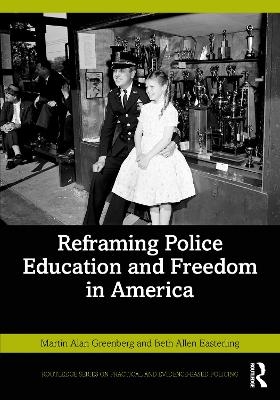
Reframing Police Education and Freedom in America
Routledge (Verlag)
978-1-032-30873-9 (ISBN)
This book untangles the components of police education and advocates a robust community-based training model with significant civilian oversight. The recommended approach recognizes that the citizenry needs to be included in the provision of basic police education, for it is they who must both support and be served by their police. The police must be role models for society, demonstrating that freedom and rights come with obligations, both to the community as a whole and to individuals in need within that community. Ultimately, the quality of police training and the public’s safety depend not only on the leadership of police executives as well as the quality of educational institutions and police candidates but also on the building of a community’s trust in its police.
The issues of police recruitment, education, and retention have greater consequence in an era when protests and other signs of negativity surround law enforcement. Several incidents, including, most notably, George Floyd’s murder by police, have sparked new training initiatives regarding police de-escalation and community engagement. At the same time, the proliferation of gun violence and a contentious political climate have led some officers to refrain from undertaking proactive types of policing. In this context, reform of the police education system is urgent. This book examines police training at all levels of government—local, regional, state, and federal. In addition, citizen participation programs, including the role of the media and programs for furthering law-related education (LRE), are highlighted. The proposed police education model recognizes that ordinary members of the American public need to contribute to the provision of basic police education, for it is they who must both support and be served by their police. The focus is on teaching a "guardian style" of policing at the local level. Police education would combine higher education, necessary practical proficiencies, and intensive field experiences through a gradual level of greater responsibility—likely extending over a 2-plus-year period for trainees with less than a year of previous college credits.
This book will be of interest to a wide range of audiences such as law enforcement professionals and trainers, including those in executive development programs in police departments; community leaders, scholars, and policy experts who specialize in policing; concerned citizens; and students of criminal justice, especially those interested in police organization and management, criminal justice policy, and the historical development of police.
Martin Alan Greenberg is president of the Virginia Association of Criminal Justice Educators and the chair of the Security and Crime Prevention Section within the Academy of Criminal Justice Sciences. He is also active in community activities concerning criminal justice reforms as well as humanitarian causes. He has authored six previous books and has served as a criminal justice program director at several universities in the USA. In New York City, he also served as a senior court officer and auxiliary police deputy inspector. Beth Allen Easterling is a visiting associate professor of criminal justice at Roanoke College, USA. Her research on the criminal justice system has largely focused on the impact of incarceration on the family and has been published in a variety of criminological and sociological journals and books. She works to raise awareness of the strength and resilience of marginalized groups in society by highlighting their success stories through her roles as a researcher and teacher.
Part I: Police Training in the 20th and Early 21st Centuries 1. Introduction: Exploring Police Education Part II: Types of Police Academies and Training 2. Big City, Regional, Hybrid and State Police Academies 3. Federal Law Enforcement Academies 4. Pre-Service, Pre-Employment, and College-Based Academies 5. Police Education on the International Level Part III: Police Academy Issues 6. Advancing Diversity in Law Enforcement 7. Police Education and the Reduction of Police Violence 8. Police Training versus Experience in the Community Part IV: Citizens, Everyday Life, and Police Training 9. Re-Thinking the Citizen Police Academy 10. The Role of Police in Law-Related Education 11. Police Academies in Popular Culture Part V: Looking Towards the Future: A Call to Action 12. A Model for Decentralized Police Education and Training
| Erscheinungsdatum | 19.09.2023 |
|---|---|
| Reihe/Serie | Routledge Series on Practical and Evidence-Based Policing |
| Zusatzinfo | 7 Halftones, black and white; 7 Illustrations, black and white |
| Verlagsort | London |
| Sprache | englisch |
| Maße | 178 x 254 mm |
| Gewicht | 620 g |
| Themenwelt | Geisteswissenschaften ► Psychologie ► Allgemeine Psychologie |
| Geisteswissenschaften ► Psychologie ► Arbeits- und Organisationspsychologie | |
| Recht / Steuern ► EU / Internationales Recht | |
| Recht / Steuern ► Strafrecht ► Strafverfahrensrecht | |
| Sozialwissenschaften ► Politik / Verwaltung | |
| Sozialwissenschaften ► Soziologie | |
| Wirtschaft ► Betriebswirtschaft / Management ► Personalwesen | |
| ISBN-10 | 1-032-30873-7 / 1032308737 |
| ISBN-13 | 978-1-032-30873-9 / 9781032308739 |
| Zustand | Neuware |
| Informationen gemäß Produktsicherheitsverordnung (GPSR) | |
| Haben Sie eine Frage zum Produkt? |
aus dem Bereich


